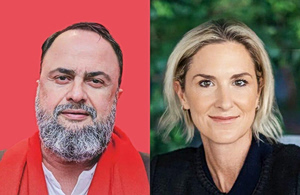Marie-Agnes Strack-Zimmermann, Chair of the Subcommittee on Security and Defense and a Member of the European Parliament with Renew Europe, spoke to To Vima International Edition about pressing political and security challenges facing Germany and the EU.
Will the new EU mandate achieve strategic autonomy, or will fragmentation hinder progress? How can the EU finance its defense ambitions?
We have to try everything to achieve strategic autonomy: that is not just an ambition, it is also an urgent necessity for the EU. Defense and security issues are fundamental to the future of our Union and our continent. If we can’t defend ourselves against the many threats and challenges we face, we will have no future.
Challenges both internal and external are forcing us to double our efforts. Whether in response to the shifting global order or the potential impact of the US elections, the EU must prepare to take a leading role in safeguarding its citizens. Strategic autonomy is the path to a stronger and more resilient Europe, and this means ensuring we have the capacity to act decisively, even when global alliances are facing uncertainty.
To finance these efforts, we must urgently explore all the possibilities provided for by the Treaties. The European Defense Fund is a good starting point, but we need more.
Is the European Parliament ready for the implications of Trump’s re-election? As a defense expert, what impact could a second term have on Europe’s defense efforts, especially with leaders like Hungary’s Viktor Orbán openly supporting his win?
With Donald Trump now President-elect, the European Parliament must take decisive action to address the implications his administration will have for European defense and security. His previous presidency highlighted the volatility of transatlantic relations, and his return reinforces the urgent need for Europe to take greater responsibility for its own defense.
This legislative term will be pivotal for European security. Our collective actions will determine whether Europe can effectively address both current threats, such as the war in Ukraine, and future challenges that demand greater strategic autonomy. Providing robust support to Ukraine remains critical, but we must also focus on regenerating Europe’s long-term defense capabilities and ensuring the EU can act independently when needed.
Patriots for Europe, a political group composed of nationalists and far-right MEPs, managed to place third among political groups. What consequences could the rise in the number of nationalists have, both for the European Parliament and for the EU as a whole?
The increase in nationalist and far-right representation is a wake-up call for all pro-European forces. This shift highlights the need for us to reaffirm our commitment to a progressive, inclusive, and united Europe. As democrats, we must focus on convincing more citizens of the tangible benefits of European integration, and on ensuring the EU is seen as a source of solidarity, security, and opportunity for all.
What sort of turbulence could the Far Right cause for a major power like Germany?
Far-right parties in Germany and elsewhere often promote attitudes and values that challenge the foundations of liberal democracies. Their emphasis on nationalism risks destabilizing the EU’s commitment to unity and shared governance. Fragmentation within the EU could reduce the bloc’s global influence in the long term. However, the challenge they pose also provides an opportunity for pro-European parties to renew their efforts, foster stronger connections with citizens, and prove that unity is our greatest strength when it comes to facing the complex issues that lie ahead.
You previously stated that German Chancellor Olaf Scholz shapes policy based solely on polls. Is this why Berlin implemented stricter border controls, and what message does this decision convey?
The Dublin Regulation is no longer effective at managing the challenges of migration. Germany temporarily closing its borders underlines the importance of implementing the migration agreement the member states reached, of it translating into concrete action. Resorting to border closures, however, cannot ultimately be the solution to these issues. Instead, we must focus on securing our shared “European house,” while maintaining openness and accessibility within our internal borders. This approach balances security with the principles of solidarity and cooperation that define the European Union.
The EU still finds itself caught between two wars, in Ukraine and the Middle East. Do you believe the EU’s policies in relation to the conflicts so far have been successful?
The EU has done a great deal to support Ukraine in its ongoing fight against the Russian aggressor. However, it is crucial that we do not merely offer Ukraine a lifeline to prevent it from sinking; instead, we must act decisively to pull it out of the water. Therefore, I strongly welcome President Biden’s decision to allow Ukraine to strike deep within Russian territory. This empowers Ukraine to target Russian military infrastructure and cut off Russian supply routes, thereby weakening the aggressor’s ability to continue its offensive. Such actions are essential for leveling the playing field and supporting Ukraine in its defense. It is now up to the EU member states to provide still more military assistance. The EU’s commitment to Ukraine has been unwavering, but now is the time to intensify our efforts even more.
How would you describe the new political situation in Germany, and what do you expect from the elections?
We would have preferred to call early elections in a more orderly manner, with proper preparation and planning. However, it became clear the coalition government could no longer reach the necessary compromises. When political gridlock reaches this point, the only democratic solution is to give voters the opportunity to make their voices heard once again through a new election. When a government can no longer function cohesively, it is vital to turn to the electorate to decide how the country should move forward.


